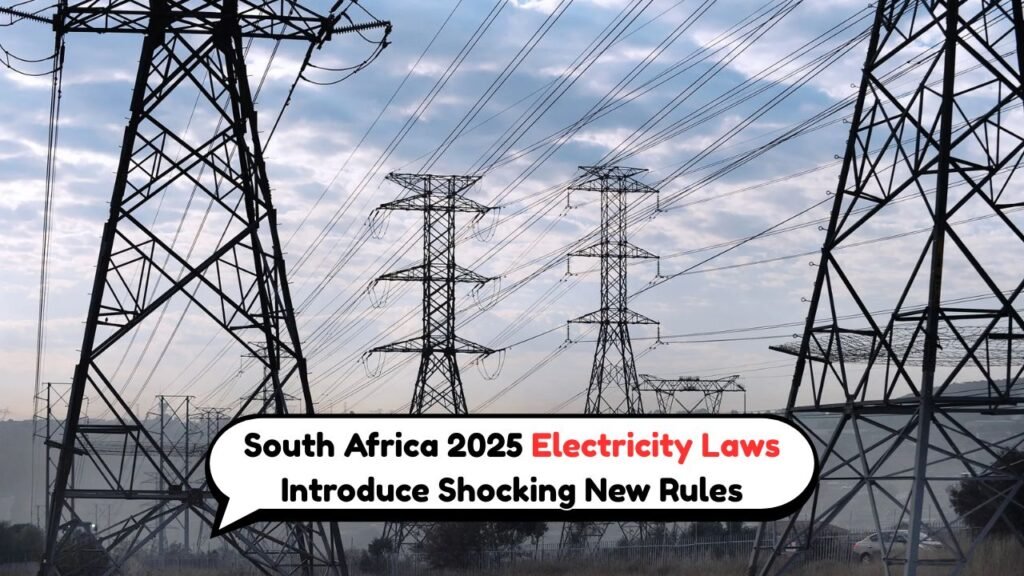South Africa’s 2025 Electricity Laws: South Africa is on the brink of a significant transformation in its energy sector with the introduction of new electricity laws set to take effect in 2025. These legislative changes promise to reshape how electricity is generated, distributed, and consumed across the nation. The upcoming regulations aim to bolster energy security, encourage sustainable practices, and empower consumers with more choices. As the country grapples with persistent energy challenges, these reforms are poised to create a more resilient and efficient electricity market. South Africans can expect a dynamic shift in their energy landscape, with potential impacts on everything from household energy bills to the broader national economy.

Understanding the 2025 Electricity Law Overhaul
In anticipation of the 2025 electricity law reforms, South Africa’s energy sector is gearing up for a comprehensive overhaul designed to modernize the existing framework. The new laws are expected to facilitate greater grid stability by integrating renewable energy sources more effectively. This shift is crucial as the country seeks to transition away from its heavy reliance on coal, which currently dominates the energy mix. By encouraging investments in solar, wind, and other renewable technologies, the government aims to foster a cleaner and more sustainable energy future. Additionally, the legislation will introduce mechanisms to enhance competition within the energy market, allowing new players to enter and innovate. This competitive landscape promises to benefit consumers through more competitive pricing and improved service delivery. As South Africa moves toward a decentralized energy model, the laws will also support the development of microgrids and other localized energy solutions, empowering communities to take charge of their energy needs.
Implications for Consumers Under the New Electricity Laws
For consumers, the 2025 electricity laws signify a new era of empowerment and choice. One of the most notable changes is the expected reduction in energy costs as increased competition drives prices down. Consumers will have the opportunity to select from a range of service providers, choosing plans that best suit their needs and budgets. Furthermore, the emphasis on renewable energy will enable households to invest in solar panels and other green technologies, potentially achieving energy independence and further reducing their monthly bills. The laws also prioritize transparency and accountability, with stricter regulations ensuring that providers deliver on their promises and maintain high service standards. As energy efficiency becomes a central focus, consumers can expect incentives for adopting energy-saving practices and technologies. These changes will not only reduce individual carbon footprints but also contribute to national sustainability goals. Overall, the new laws aim to create a more equitable energy market where consumers are informed, empowered, and supported in making sustainable choices.
How Businesses Will Adapt to the 2025 Electricity Laws
Businesses in South Africa are set to experience both challenges and opportunities as they adapt to the 2025 electricity laws. With the shift towards renewable energy, companies will need to reassess their energy strategies to remain competitive and compliant with the new regulations. This transition presents an opportunity for businesses to innovate and invest in sustainable practices that can reduce operational costs and enhance their environmental credentials. As the laws encourage the adoption of energy-efficient technologies, businesses that prioritize sustainability are likely to gain a competitive edge. Moreover, the increased availability of renewable energy sources will allow companies to reduce their carbon footprint, aligning with global trends towards corporate social responsibility. However, the transition may also pose challenges, particularly for industries heavily reliant on traditional energy sources. These businesses will need to proactively seek solutions to integrate renewables into their operations, which may require significant capital investments and strategic planning. In the long run, businesses that successfully navigate these changes will be well-positioned to thrive in an evolving energy landscape.
The Role of Renewable Energy in South Africa’s Future
Renewable energy is set to play a pivotal role in South Africa’s future, especially in light of the impending 2025 electricity laws. As the country seeks to reduce its reliance on coal and other non-renewable resources, the integration of solar, wind, and other renewables into the energy mix is a key priority. This transition is not only vital for environmental sustainability but also for economic growth, as renewable energy projects create jobs and stimulate local economies. The new laws will support this shift by providing incentives for renewable energy investments, facilitating the development of infrastructure, and streamlining regulatory processes. Furthermore, the focus on renewables aligns with global efforts to combat climate change, positioning South Africa as a leader in sustainable energy practices. As the country embraces this green revolution, it will also address critical issues such as energy access and affordability, ensuring that all South Africans benefit from a cleaner, more reliable energy system. The move towards renewable energy is a significant step forward in building a resilient and sustainable future for the nation.







